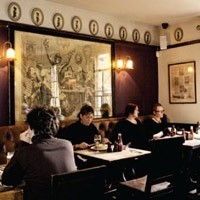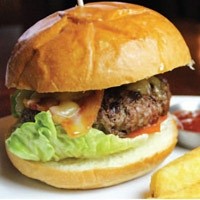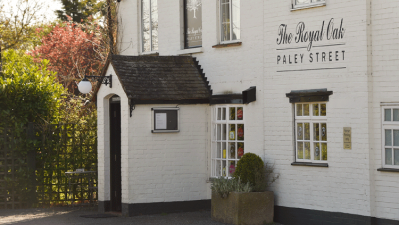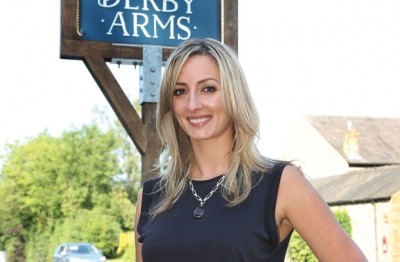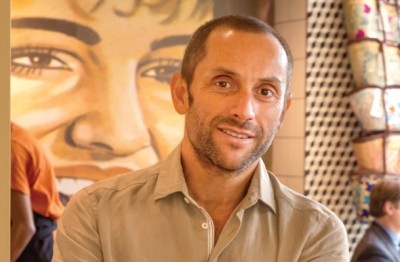Business Profile: Fuller's
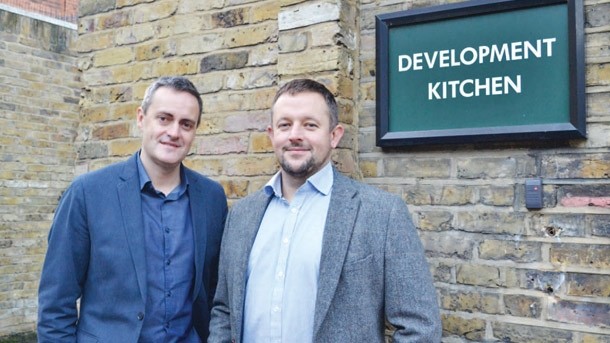
The Tokenhouse lies moments from Bank station on Moorgate, London, and has been tailored to attract a broad cross-section of city workers. Designed by Harrison, it blends traditional pub features – brass lamps, tan leather banquettes and black and white pictures referencing the local area – with more contemporary elements, like exposed ducting and white tiling, which wouldn’t look out of place in a casual-dining restaurant.
Prices are comparable to the upper end of the branded restaurant sector. A sirloin steaks with chips and peppercorn sauce costs £25, fish and chips is £13 and the wine list tops out at £221 for a bottle of 2007 Chateau Lynch-Bages. The City venue is as suited for a quiet afternoon pint as it is for a quick business breakfast or celebratory lunch, and highlights just how far the sector has come in recent years as well as the blurring of the lines between pubs and restaurants.
“There wasn’t a particular ‘eureka moment’ when we realised food was the future,” says Jonathon Swaine, the managing director of The Tokenhouse’s owner, Fuller’s Inns, the pub-operating division of the famous West London brewer. “None of us really knew what the smoking ban would mean for pubs but in our business, it was largely positive. We started seeing new customers – namely women and families.”
The smoking ban coincided with the recession, a perfect storm that wasn’t at all kind to the wider pub trade but Fuller’s’ comparatively upmarket positioning and, by extension, pubs in lucrative areas (mostly London and its surrounding counties) saw it at least partially insulated. Food sales increased, but sales of traditional beer – much of it brewed by Fuller’s itself at its brewery in Chiswick, West London – plateaued.
Kitchen investment
The company invested heavily in its kitchens and food team and, since 2008, food sales within Fuller’s’ managed estate (the pubs run directly by the company) have doubled – mainly achieved by converting wet-led sites to food-led, a process that has, according to Swaine, been nearly always successful.
“You have to listen to your customers. The few times we’ve had problems, we’ve been able to correct the situation by talking to the regulars and making sure the offer is right for them. One of the great strengths of our businesses is that no two pubs are alike. Every one of our pubs has a different menu,” he says.
The Fuller’s estate comprises 386 pubs – 204 tenanted and leasehold pubs, and 182 managed outlets. For those not familiar with the inner workings of the pub trade, tenanted and leasehold pubs are usually owned by a brewery (like Fuller’s) or a pubco (such as Punch Taverns or Enterprise Inns) and run as independent businesses by licensees.
The former typically requires less ingoing investment from the licensee than the latter. Both represent a relatively cheap way of getting into the hospitality business and pub lets are therefore an increasingly common route for chefs looking to strike out on their own. Managed pubs are run by managers, who work for a pub chain.
Beer tie
Last year, the pub landscape was shaken to its very core when MPs backed a new law that would effectively scrap the ‘beer tie’, which obliges licensees to buy drinks from their landlords at an inflated rate in return for lower rents.
These changes to the 400-year-old model have prompted Fuller’s to rethink its approach to letting out its pubs with no new leaseholds currently being offered.
Fuller’s tenanted and leasehold estate is varied, taking in everything from serious food pubs – including the Michelin-starred The Royal Oak Paley Street, in Berkshire – to spit-and-sawdust backstreet boozers, although Swaine says these wet-led community haunts now only make up a small part of the group.
The managed arm of Fuller’s is in good health. Late last year, it reported a 6.5 per cent increase in like-for-like sales across its managed pubs and hotels division, helped by a rise in like-for-like food sales of 7.7 per cent Profits were also up by 13 per cent.
But despite these positive numbers, and an upswing in the wider economy, Swaine says it’s still a tough trading environment. “We’re very aware of the intense competition in the eating-out space at the moment. But our premium positioning in the pub marketplace helps – it gives our business a clear focus. For well-invested, properly run pubs in good locations the future is bright. British people love great pubs.”
One of the biggest challenges for Swaine and Fuller’s Inns’ head of food Paul Dickinson is keeping pace with the restaurant sector, which tends to move more quickly from a trends perspective.
“It’s hard to keep up. But our secret weapon is that we offer variety. A lot of the hot new restaurant concepts have very tight offerings.
These specialist places also have a quick turnaround on tables. Our pubs have a great atmosphere and people feel they can linger, it’s a potent combination,” says Dickinson, who joined Fuller’s in early 2011 from Restaurant Associates, the fine-dining arm of contract caterer Compass, and cut his teeth under Marco Pierre White at The Oak Room. “One of the big lessons we have learned in recent
years is that we need to get food out quickly. We need to be on a par with the restaurant sector or we’ll lose business, particularly at lunchtimes.”
Non-branded
Unlike the majority of its peers, Fuller’s doesn’t really do brands. The closest it comes is Fuller’s Ale & Pie, a 16-strong outfit based mainly in central London with a focus on – you guessed it – real ale and freshly made pies, although each menu is slightly different. It shifts 4,500 to 5,000 pies a week.
With 182 sites serving 182 different menus, Dickinson’s job is barely comparable to a head of food overseeing Dickinson’s key weapons to ensure high-food quality are controlling the supply chain, ensuring high-skill levels in the kitchen and closely monitoring the output of his huge brood of head chefs.
“It’s certainly an interesting role. We try not to be too prescriptive as one of our strengths is that each pub is different and carefully tailored to its location. In addition, giving our head chefs autonomy allows us to attract a better calibre of candidate and is good for the morale of the whole kitchen team. With all that said, there are set formats for menus and we do require that our head chefs use the same network of suppliers,” says Dickinson, who is supported by nine executive chefs. Each is responsible for 20 or so similar pubs and work closely with operations managers to ensure the food offering is right for the pub and of a high standard.
Fuller’s has five core dishes available at all of its managed sites: burgers, fish and chips, sausage and mash, pies and Sunday roast dinners. These pub classics aren’t identical across the estate but there are a number of standards that must be adhered to, for example fish and chips must be made with cod rather than haddock for reasons of sustainability and portion size, and suppliers are consistent across the group.
“We use different beers for the batter for a bit of local expression, but we have to be rigorous in ensuring our chefs stick to the script because it means better consistency for the guests, and it also drives margin,” says Dickinson.
Burgers
With competition in the burger space at an all-time high, Fuller’s has invested a lot of R&D into its own patty. Dickinson’s team has worked with Hampshire-based butcher Owton’s to create a bespoke recipe that sees a mix of aged cuts fed through a machine that ensures the strands of mince all run in the same direction for easier eating. The burgers are delivered fresh across the estate every day.
“We’ve eaten at a huge number of burger places in the UK and the US. It’s hard to compete with specialists because they have economies of scale on their side and can put more premium cuts into their burgers,” says Dickinson. “But on a good day, the managed estate shifts 6,000 burgers so it’s very important we get it right.”
The Fuller’s managed food team has created a number of other custom products for its estate including its London porter smoked salmon. Produced in Gloucestershire by Severn & Wye Smokery the porter-cured product is now the biggest selling starter in the business.
Staff training
Staff training and making the pub kitchen more attractive to skilled chefs is a focus for both Dickinson and Swaine. An investment drive has seen 70 pubs refurbished with top-of-the- line kit during the past five years and a new training scheme ensures talent is identified and given a clear route of progression.
Dickinson worked with the British Institute of Innkeeping to create a three-level scholarship programme that sees chefs at various levels sent around the estate for mentoring and concludes with a live competition at the Wessex Salon Culinaire.
Expansion at Fuller’s is conservative, but it is indicative of success rather than stagnation. The company has also been closing some pubs that don’t fit in with the estate, a recent example being the Red Lion in Bloxham, Oxfordshire, which was sold to the village last year and now trades as a community freehouse. With premiums for existing pubs in prime locations at an all-time high – last year, the Black Lion on Bayswater Road changed hands for an extraordinary £27m – growth is being driven by new-build sites.
Fuller’s has partnered with a number of developers to build freehold pubs in upmarket residential locations. Recent examples include the One Over the Ait in Brentford, West London; The Tideway in Hammersmith; and The Sail Loft in Greenwich.
Fuller’s has also acquired some going concerns during the past few months, including The Three Guineas in Reading and Grand Central in Brighton.
“We’re very picky about what we open,” says Swaine. “We didn’t go hell for leather during the glory days. We were accused of being too traditional and cautious in our approach but most of the pub businesses that grew fast during that period are now shadows of their former selves.”
The Fuller’s managed estate did enjoy a small boost last year with the acquisition of The Stable, a South West-based chain that blurs the lines between restaurant, bar and pub with a focus on pizza and cider. Since the buyout, sites have opened in Falmouth and Plymouth bringing the group up to seven sites with a number of new locations already lined up for this year.
Founders Nikki and Richard Cooper remain on board as joint managing directors and a conscious effort is made to run the business on an entrepreneurial basis.
“It’s a young brand with a consistent and distinctive offering that we were able to get involved with for relatively low amounts of capital,” says Swaine.
“The wider eating-out sector has developed at an astonishing rate and it’s good to be involved in something that’s genuinely new.”
Fuller’s is a member of Restaurant’s R200 Club. For information on joining the club contact wbnaar.ubegba@jeoz.pbz.
